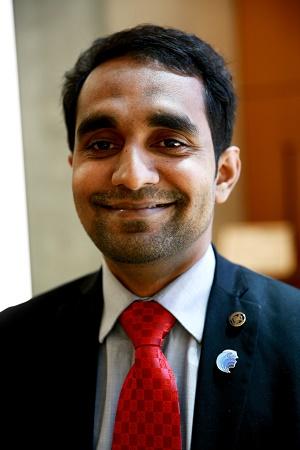As a recipient of the Australian Maritime Safety Authority’s (AMSA) tertiary scholarships, Mohammed Taslim of Fiji had the opportunity to study at the World Maritime University (WMU) in Sweden to complete a master’s degree.
Back in Fiji, Mohammed works for the Maritime Safety Authority Fiji (MSAF) which is connected to Fiji National University (FNU) and also part of the institute where he works. The institute is currently managed by Sri Lanka’s, Colombo International Nautical and Engineering College CINEC. CINEC have managed the institute for six years and Mohammed’s training at the WMU will enable him to integrate a level of expertise including strategic planning particularly in the area of e-learning education and training.
expertise including strategic planning particularly in the area of e-learning education and training.
Studying in Sweden was not without its difficulties—language was a clear barrier initially and the culture itself required a big adjustment—however, Mohammed used this experience to build confidence as well as new language skills in Arabic. Mohammed was also a part of the student association at the WMU and published a number of articles in the student life magazine providing a platform for him to share his insights with academic peers. Although being far from home was challenging, support was never far away.
‘I have a small daughter, she will be turning four and I missed her and my wife very much. I was away for fourteen months but the good thing was when we arrived in Sweden we were assigned Swedish parents so they became like my Mum and Dad. Whenever I felt lonely and needed help, they were always there for me. For me it was very good to have their support,’ Mohammed shares.
In Sweden, Mohammed focused his master’s studies in the area of e-learning, recognising online learning provides an opportunity for people who may not have access or the means to study face-to-face, to participate in academic learning. And in many cases, e-learning allows students to tailor their studies to their individual lifestyle and professional schedules. However Mohammed also understands academic studies in maritime studies should always have a balance of practical and theoretical training.
‘At the moment in Fiji there is no online maritime training and education nor e-learning, it is all face-to-face for seafarers but in the near future we hope to offer online learning perhaps in the next twenty years,’ he said.
Mohammed recognises there is great potential to diversify and expand online education in the maritime sector in Fiji and potentially within the Pacific region. He identifies the scope to promote participation from those already working as seafarers or in the maritime industry in Fiji. Master mariners and chief engineers tend to take positions sailing internationally as opposed to accepting roles as educators because of preferable work conditions abroad.
‘In Fiji, it is difficult to recruit qualified and competent seafarers to educate the next generation of students in Fiji. I would like to encourage young seafarers to take on academic studies in the formative stages of their career to increase their knowledge and expand their opportunities in the maritime sector in Fiji,’ he said.
And no better way than to promote pathways for academic studies than to implement an e-learning module for seafarers to complete studies while they’re working in the field. Mohammed hopes to be a cog in the wheel of change in terms of devising and implementing online maritime academic education in Fiji.
‘I see this as a wise long-term plan for young seafarers when they finish their career and perhaps complete their academic studies including a masters and/or PhD whilst continuing their career. And beyond their work as seafarers, they can apply their expertise as educators to the next generation of seafarers.
‘In many areas, maritime education is competency based training therefore at some point you can provide lectures and online learning but for other areas of the training, practical learning and assessment is essential,’ he said.
In other words, having the means to provide academic e-learning as a complimentary option for seafarers will ideally build an inclusive education opportunity.
As I am photographing Mohammed, I notice a delicate pin attached to his suit jacket lapel and ask him what it symbolises, he is quick to share.
‘The pin symbolises empowering women in the maritime community, this was also the theme for the World Maritime Day 2019 which addresses the gender gap in the maritime, ports, fishing and related industries. It represents a call to action from maritime and other stakeholders in support of achieving the United Nations Sustainable Development Goals (SDGs), in particular Goal 5 related to gender equality,’ he said.
Mohammed’s studies have shaped him personally and will no doubt influence his future - the tyranny of distance for him was worth it. Beyond studies, his ambitions are to integrate technology to encourage academic e-learning. Mohammed views e-learning as an exciting avenue for positive progress and a clear pathway to build a professionalised culture in the maritime industry in Fiji and the Pacific region.